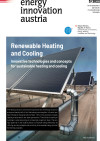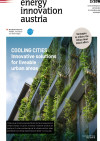Suchergebnisse für "Factsheet: Energietechnologien gestalten, die für alle sinnvoll und nutzbar sind"
Digital transformation of the Austrian construction industry and its impact on employment
What are the impacts of the digital transformation of the Austrian construction industry on this sector’s labour market? By looking at the next five to ten years it will be analysed whether and to what extent digital applications lead to an increasing, falling or stagnant demand for employees in the construction industry and in construction occupations.
Mission Innovation Austria Online Event: Energy Communities - Findings from Innovation Programs and Pilots
23. April 2020
Online
The aim of the half-day webinar was to provide insights into energy communities and their opportunities and challenges arising from current market and regulatory regimes. More than 300 participants from 28 countries took part in the webinar.
GrünStattGrau – Innovations for Greening Cities "The green living laboratory"
GrünStadtGrau represents the holistic of competence for green building technologies such as green roofs and living walls in Austria. It generates impulses for urban green infrastructure on buildings and links innovative products and projects, supports through know-how and analysis for implementation processes. GrünStattGrau guides urban and participatory strategies from development to implementation.
ERSCP 2021 - European Roundtable on Sustainable Consumption and Production
8. - 10. September 2021
Graz
ERSCP21 will consider the possibilities to reduce the emission of climate-relevant gases during production as well as to reduce upstream emissions by changing consumer behavior. The topics discussed at the conference cover a number of UN Sustainable Development Goals.
Biotope City - construction manual for the green city of the future
"Biotope City" is an overall concept for the implementation of comprehensive urban greening with the aim of using the regenerative mechanisms of nature. With this approach, quality of life is to be comprehensively, sustainably and cost-effectively increased and resilience against extreme weather events in cities will be improved. The project aims to generate realistic components of a "construction manual" for the green city of the future, which are generalizable and transferable.
VERTICALurbanFACTORY
The project researches possibilities and potentials of highly efficient use of space through modern concepts of "stacked" functions and vertical production.
Evaluation of visionary architectural concepts
The aim of this project is to show that even at first glance unrealistic and seemingly unworkable solutions can contribute to overcome or mitigate increasingly global problems. The keywords "smart city", "smart home" (and similar ones) require solutions that are envisioned on free roads, as off-the-shelf solution often do not deliver the required output.
Housing 4.0 - digital platform for affordable living
The main aim of this project is the development of an integrated framework for the digital platform "Housing 4.0"; thus supporting integrated planning and project delivery through coupling various digital tools and databases. Thereby, the potentials of BIM for modular, off-site housing assembly in order to improve planning and construction processes, reduce cost and construction time and allow for mass customization will be explored. The novel approach in this project is user-involvement; which has been neglected in recent national and international projects on off-site, modular construction, supported by digital technologies.
Indicators for urban areas – for construction, operation and mobility in climate-friendly areas
Development and coordination of indicators for energy and ecological evaluations of urban areas based on the Swiss 2000-Watt certification system. The results will be used for the development of a quality assurance system for urban areas similar to the klimaaktiv declaration for buildings and the e5 certification for communities.
EnergyCityConcepts - Methods and concepts for the implementation of sustainable energy systems in cities
Two concrete model regions (small city Gleisdorf and urban city quarter Salzburg-Schallmoos) will be developed and tested using new methodical approaches (interdisciplinary urban and regional energy planning, modeling and simulation). Therefore, it is aimed to substantiate scenarios and concepts for the implementation of defined targets on technical, ecological and economic criteria.
Urbane GmbA - Urban potential of greenable area in the obscured stock
Urbane GmbA aims to explore and assess the potential of greenable area from building and obscured stock (vertical and horizontal areas) in Vienna, to apply currently available survey instruments and to show research and development needs.
RCC – Reduced Carbon Concrete: Implementation of CO2-redudes concrete in construction sites
The objectives of the present project "RCC - Reduced Carbon Concrete" were to test the current knowledge about the temperature-dependent curing processes of performance concretes by concrete work on large components on the construction site, under summer and winter conditions, and in precast production. The results will be incorporated into construction practice and standardization work.
SmartCity Baumgarten - Demonstration of an anergy network and implementation of climate-friendly solutions in existing districts
Implementation of a cross-property anergy network for the supply of heating, cooling and electricity in an existing neighbourhood. With this demonstration project, a technical-legal alternative for areas outside of district heating supply is developed, which makes it possible for neighbourhoods to join together to use renewable energies in common.
GREENsChOOLENERGY - Development and practical implementation of sustainable solutions for urban hotspots in combination with greening / PV / water
Use of the synergetic effects in the construction of photovoltaic, greening and irrigation systems at the location of HTL1 Klagenfurt Lastenstraße, to optimize the yield of experimental photovoltaic elements and at the same time reduce urban heat islands.
CELL4LIFE - Reversible SOCs as a link between electricity, heat and gas networks to increase the self-sufficiency and resilience of neighbourhoods
A system consisting of a solid oxide fuel cell and a Machine Learning-based control system for increasing efficiency and minimizing degradation is being developed. As a link between all energy supply networks, the system is intended to increase the self-sufficiency and resilience of plus-energy districts.
Renewable Heating and Cooling

Innovative technologies and concepts for sustainable heating and cooling
energy innovation austria
3/2022
Herausgeber: BMK in cooperation with the Climate and Energy Fund
Englisch, 12 Seiten
Downloads zur Publikation
Cooling Citites

Innovative solutions for liveable urban areas
energy innovation austria
2/2019
Herausgeber: BMVIT und Klima- und Energiefonds
Englisch, 12 Seiten
Downloads zur Publikation
GREeNvaluation - Real-time monitoring and performance evaluation
The aim of the project was the development of the GREeNvaluation toolkit, as a precursor to the implementation of green and liveable cities. The visualization and accounting (cost / benefit) of green infrastructure services makes the benefits more tangible and understandable. The GREeNvaluation toolkit aims to create awareness far beyond the target areas by means of target group-specific communication formats.
Vilipa - Visible light based Person and Group Detection in existing buildings
Evaluation of the technical and economic feasibility of an occupancy detection system based on the technology of visible light sensing, which, in combination with the building management system, should reduce the energy consumption of buildings. The goal is to implement low-tech/low-complexity solutions that can distinguish between individuals and groups based solely on the detection of visible light reflections.
ESSBAR – Edible balcony gardens for retrofit – Vertical Greening Technologies for the City
Demonstration of an affordable, resource-saving and innovative balcony system with integrated edible vertical gardens and rainwater management. Considering the needs of residents for green outdoor spaces and the active participation of residents are an important part of the project.
